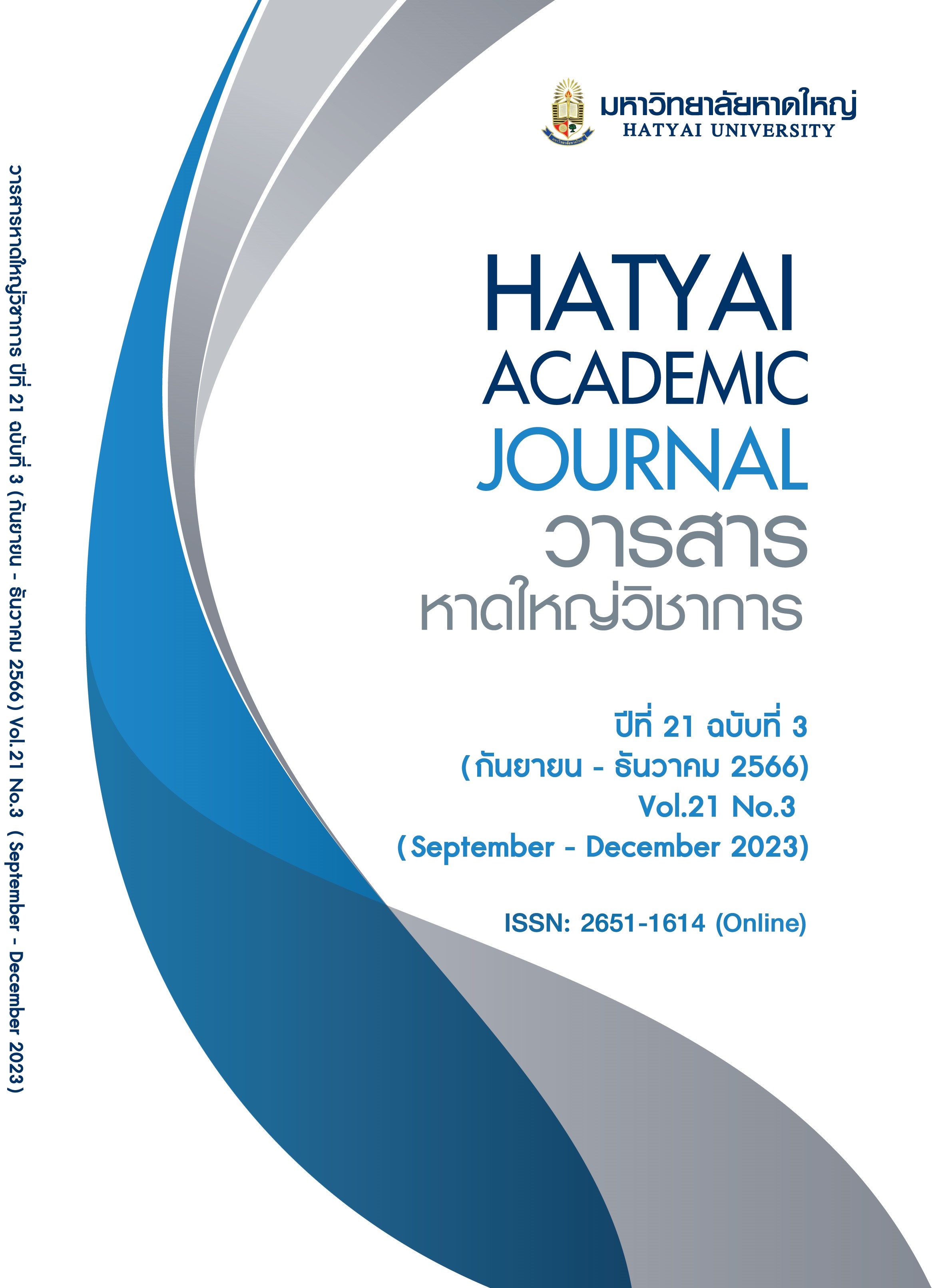A Model of the Linkage between Tourism Research Results and the Usage of the Results by Tourism Business Entrepreneurs in the Andaman Tourism Cluster
Main Article Content
Abstract
The objective of this study was to develop a model for linking tourism research results to the utilization of the results by tourism business entrepreneurs in the Andaman tourism cluster. This was a mixed research method using both quantitative and qualitative analyses. The population of the study involved Andaman tourism entrepreneurs, researchers, and funding source officers. This research applied convenience sampling to choose 400 samples for quantitative data. The statistics used for data analysis consisted of frequency distribution, percentage, mean, standard deviation, and regression coefficient. As for qualitative data, 40 subjects were selected by random sampling to attend in-depth interviews, including group discussion. Data were analyzed using content analysis techniques. The results of the research found 123 tourism research studies in the Andaman tourism group were conducted over the past 10 years (2009-2019), and there were five funding sources. The process of disseminating research studies was in the form of publishing articles in academic journals, in the online library database systems, and presentations at domestic and international academic conferences. It was found that factors affecting research utilization were three co-predictive parameters: the researcher, the communication of research results, and the tourism business operator’s learning aspect, which predicted or influenced the research utilization significantly at the 0.001 level (R2 = 0.396). Furthermore, it was found that the predictive parameters of selecting a research topic did not have a statistically significant influence on the research utilization. The linkage model of tourism research results in the Andaman tourism group consisted of five compositions (SACLO): selecting the research topic, the researcher, the communication of research results by the researcher, the learning aspect of the tourism business operators, and the output of the research utilization.
Article Details

This work is licensed under a Creative Commons Attribution-NonCommercial-NoDerivatives 4.0 International License.
All published articles are evaluated by three qualified peer reviewers from various institutions through a double-blind process, where reviewers do not know the authors’ identities and authors do not know the reviewers’ identities. The content and articles in the Hatyai Academic Journal reflect the authors’ views only and are neither the opinions of the editorial board nor the responsibility of Hatyai University. The Editorial Board of the Hatyai Academic Journal allows articles to be reproduced for academic purposes, on the condition that the original source is clearly cited.
References
Berlo, D. K. (1960). The process of communication: An introduction to theory and practice. New York: Holt Rinehart and Winston.
Charoenchotithum, A., Thummasena, A., & Jenjad, R. (2017, April 28). Strategic communication: Using new media to disseminate research work to the new generation. In The RSU National Research Conference (p.789 - p.800). Rangsit University, Pathumthani. [in Thai]
Creswell, J. W. (2009). Research design: Qualitative, quantitative, and mixed methods approaches (3rd ed.). California: Sage.
Cronbach, L. J. (1990). Essentials of psychological testing (5th ed.). New York: Harper Collins.
Edmonds, W. A., & Kennedy, T. D. (2013). An applied reference guide to research designs: Quantitative, qualitative, and mixed methods. London: Sage.
Frost, A. (2010). Building knowledge management frameworks and models. Retrieved from http://www.knowledge-management-tools.net/knowledge-management-frameworks.html
Isichaikul, R. (2014). Specialized tourism management. Nonthaburi: Sukhothai Thammathirat Open University Press. [in Thai]
Junhasobhage, J. (2016). Strategies to encourage the creation of research for the utilization of Ramkhamhaeng University. Journal of Doctor of Social Sciences, 6(1), 20-30. [in Thai]
Kenaphoom, S. (2019). Principle and approach of academic synthesis. Journal of Local Governance and Innovation, 3(2), 89-105. [in Thai]
Ketudat, S. (1995). Researcher role in current context. Journal of Behavioral Science, 1(1), 9-16. [in Thai]
Makmee, P. (2016). Research design for mixed method research. Journal of the Associated of Researchers, 21(2), 19-31. [in Thai]
Metarikanon, D. (2015). Information and communication technology for information management. Bangkok: Chulalongkorn University Printing House. [in Thai]
National Research Council of Thailand. (2018). Best practices for applying research to teaching and learning or integrating research into classes Chiang Rai Rajabhat University. Retrieved from http://i4biz.nrct.go.th/ewt_news.php?nid=34 [in Thai]
National Science and Technology Development Agency. (2011). Thai national research repository. Retrieved from http://www.tnrr.in.th [in Thai]
Office of the Bureaucratic Development Commission. (2020). Knowledge management. Retrieved from http://www.catc.or.th/KM/files/article/article1.doc [in Thai]
Srinon, S. (2018). Knowledge management. Retrieved from http://k.skarea2.go.th/?name=article&file=view&id=8 [in Thai]
Thailand Development Research Institute. (2013). TDRI researcher for digital communicator. Retrieved from http://tdri.or.th/attachment_id=6982) [in Thai]
Thailand Institute of Scientific and Technological Research. (2001). Research utilization plan 2012 - 2016 (Research report). Bangkok: Publisher of Strategic and Business Development Group. [in Thai]
Tharapit, C. (2013). Application of information and communication technology for the business operation of traditional retailers. Journal of Business Administration, 8(2), 225-238. [in Thai]
The Thailand Research Fund. (2018). Strategy (2017 - 2021). Bangkok: Publisher of Xeno Publishing & Package. [in Thai]
Tippakoon, P. (2019). Factors influencing research utilization by Thai governmental agencies. Journal of Humanities and Social Sciences, 11(21), 102-122. [in Thai]
Tourism Authority of Thailand. (2020). Thailand tourism strategy 2015 - 2017. Retrieved from http://www.mots.go.th/ewt_dl_link.php?nid=7114 [in Thai]
Wongwanit, S. (2002). A systhesis of needs assessment techniques used in students’ thesis of Faculty of Education, Chulalongkorn University. Journal of Research Methodology, 15(2), 255-277. [in Thai]
World Travel and Tourism Council. (2017). Travel and tourism economic impact Caribbean. London: World Travel and Tourism Council.


